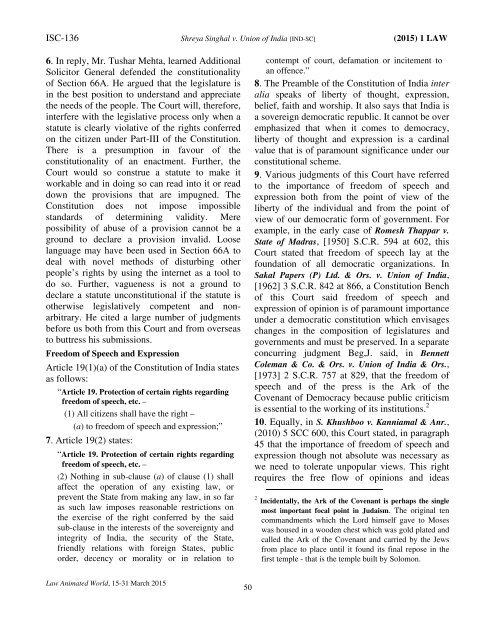Editor: I. Mallikarjuna Sharma Volume 11: 15-31 March 2015 No. 5-6
Martyrs memorial special issue of 15-31 March 2015 paying tributes to Bhagat Singh and other comrades.
Martyrs memorial special issue of 15-31 March 2015 paying tributes to Bhagat Singh and other comrades.
You also want an ePaper? Increase the reach of your titles
YUMPU automatically turns print PDFs into web optimized ePapers that Google loves.
ISC-136 Shreya Singhal v. Union of India [IND-SC] (20<strong>15</strong>) 1 LAW<br />
6. In reply, Mr. Tushar Mehta, learned Additional<br />
Solicitor General defended the constitutionality<br />
of Section 66A. He argued that the legislature is<br />
in the best position to understand and appreciate<br />
the needs of the people. The Court will, therefore,<br />
interfere with the legislative process only when a<br />
statute is clearly violative of the rights conferred<br />
on the citizen under Part-III of the Constitution.<br />
There is a presumption in favour of the<br />
constitutionality of an enactment. Further, the<br />
Court would so construe a statute to make it<br />
workable and in doing so can read into it or read<br />
down the provisions that are impugned. The<br />
Constitution does not impose impossible<br />
standards of determining validity. Mere<br />
possibility of abuse of a provision cannot be a<br />
ground to declare a provision invalid. Loose<br />
language may have been used in Section 66A to<br />
deal with novel methods of disturbing other<br />
people’s rights by using the internet as a tool to<br />
do so. Further, vagueness is not a ground to<br />
declare a statute unconstitutional if the statute is<br />
otherwise legislatively competent and nonarbitrary.<br />
He cited a large number of judgments<br />
before us both from this Court and from overseas<br />
to buttress his submissions.<br />
Freedom of Speech and Expression<br />
Article 19(1)(a) of the Constitution of India states<br />
as follows:<br />
“Article 19. Protection of certain rights regarding<br />
freedom of speech, etc. –<br />
(1) All citizens shall have the right –<br />
(a) to freedom of speech and expression;”<br />
7. Article 19(2) states:<br />
“Article 19. Protection of certain rights regarding<br />
freedom of speech, etc. –<br />
(2) <strong>No</strong>thing in sub-clause (a) of clause (1) shall<br />
affect the operation of any existing law, or<br />
prevent the State from making any law, in so far<br />
as such law imposes reasonable restrictions on<br />
the exercise of the right conferred by the said<br />
sub-clause in the interests of the sovereignty and<br />
integrity of India, the security of the State,<br />
friendly relations with foreign States, public<br />
order, decency or morality or in relation to<br />
contempt of court, defamation or incitement to<br />
an offence.”<br />
8. The Preamble of the Constitution of India inter<br />
alia speaks of liberty of thought, expression,<br />
belief, faith and worship. It also says that India is<br />
a sovereign democratic republic. It cannot be over<br />
emphasized that when it comes to democracy,<br />
liberty of thought and expression is a cardinal<br />
value that is of paramount significance under our<br />
constitutional scheme.<br />
9. Various judgments of this Court have referred<br />
to the importance of freedom of speech and<br />
expression both from the point of view of the<br />
liberty of the individual and from the point of<br />
view of our democratic form of government. For<br />
example, in the early case of Romesh Thappar v.<br />
State of Madras, [1950] S.C.R. 594 at 602, this<br />
Court stated that freedom of speech lay at the<br />
foundation of all democratic organizations. In<br />
Sakal Papers (P) Ltd. & Ors. v. Union of India,<br />
[1962] 3 S.C.R. 842 at 866, a Constitution Bench<br />
of this Court said freedom of speech and<br />
expression of opinion is of paramount importance<br />
under a democratic constitution which envisages<br />
changes in the composition of legislatures and<br />
governments and must be preserved. In a separate<br />
concurring judgment Beg,J. said, in Bennett<br />
Coleman & Co. & Ors. v. Union of India & Ors.,<br />
[1973] 2 S.C.R. 757 at 829, that the freedom of<br />
speech and of the press is the Ark of the<br />
Covenant of Democracy because public criticism<br />
is essential to the working of its institutions. 2<br />
10. Equally, in S. Khushboo v. Kanniamal & Anr.,<br />
(2010) 5 SCC 600, this Court stated, in paragraph<br />
45 that the importance of freedom of speech and<br />
expression though not absolute was necessary as<br />
we need to tolerate unpopular views. This right<br />
requires the free flow of opinions and ideas<br />
2 Incidentally, the Ark of the Covenant is perhaps the single<br />
most important focal point in Judaism. The original ten<br />
commandments which the Lord himself gave to Moses<br />
was housed in a wooden chest which was gold plated and<br />
called the Ark of the Covenant and carried by the Jews<br />
from place to place until it found its final repose in the<br />
first temple - that is the temple built by Solomon.<br />
Law Animated World, <strong>15</strong>-<strong>31</strong> <strong>March</strong> 20<strong>15</strong><br />
50



